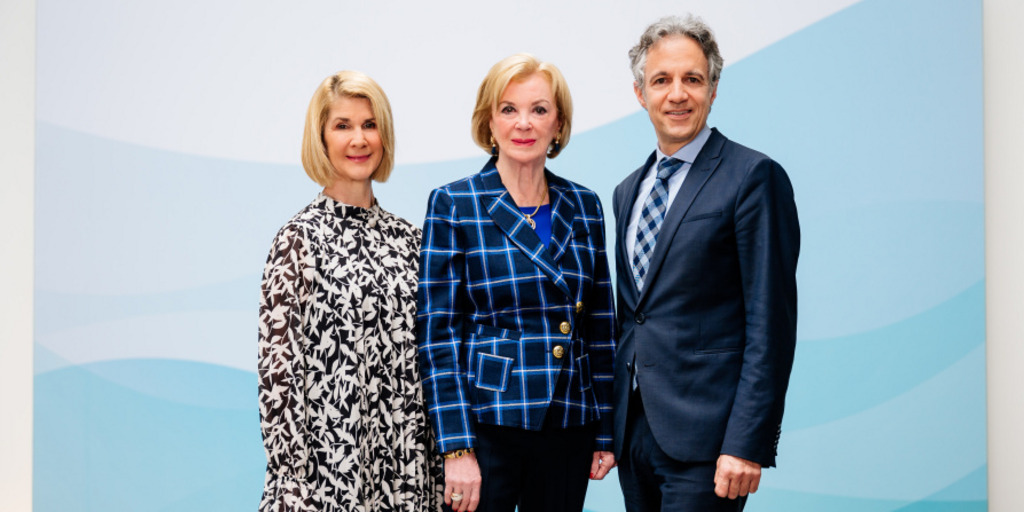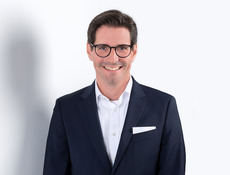In 2019, the Bertelsmann Stiftung carried out 70 projects in the areas of education, democracy, Europe, health, values and the economy. It spent €90.5 million on its nonprofit activities, €52 million of which was directly invested in its program and project work. A total of €13.6 million was used to support its "satellites" such as the Founders Foundation in Bielefeld. This represents an increase in its expenditures of some €3.5 million over the previous year. The Bertelsmann Stiftung currently employs 386 people.

Besim Mazhiqi
Projects for a strong Europe, more innovative capacity and new approaches to digitalization
The world’s democracies remain under pressure. The Bertelsmann Stiftung is therefore developing dialogue platforms across all areas of society and bringing together thought leaders worldwide from the political, business, academic and social arenas. It is also focusing on pioneering activities for refugee teachers and data analysis. Those are the developments announced by the Executive Board in its outlook for 2020.
For a strong "citizens' Europe"
The Bertelsmann Stiftung is continuing its work to increase social cohesion. The focus here is on the European Union. In view of the growing pressure being put on democracies by populism, the Bertelsmann Stiftung is creating events and forums at which representatives from politics, academia and business can interact with the public. For example, a Citizens’ Forum took place on March 1 and 2, 2020, in Berlin. Jointly organized with the Federal Foreign Office, the forum brought together 75 members of the public from Poland, France and Germany to discuss the question of how Europe can be made more tangible and concrete for its citizens and how greater citizen participation can be achieved. In conclusion, the members of the public presented their own practical suggestions and solutions to German Foreign Minister Heiko Maas during a panel discussion.
We need more exchange across all areas of society. People must be able to interact with each other freely. Representatives from the political, economic and academic spheres have to work together to develop sustainable solutions.
Liz Mohn, Vice Chair of the Bertelsmann Stiftung Executive Board
The foundation’s global dialogue events, such as those held in Salzburg, Marrakesh and Singapore, are designed to help people from different countries learn from each other, in keeping with the ideas advanced by philanthropist Reinhard Mohn.
For more innovative capacity in Europe, Germany and OWL
A high point of the foundation’s activities this year will be the awarding of the Reinhard Mohn Prize. This year’s prize focuses on how Germany can better adopt and implement innovations, including to find long-term solutions to social problems. The recipient of the 2020 prize is 61-year-old Chemi Peres, son of Shimon Peres. The successful Israeli entrepreneur and chairman of the Peres Center for Peace and Innovation in Tel Aviv is being honored for his considerable drive and vision promoting innovation and economic progress in Israel.
According to a study carried out for this year’s Reinhard Mohn Prize, almost half of all German companies have failed in recent years to adapt their innovative capacities to reflect changing conditions. Together with the German Economic Institute in Cologne, the Bertelsmann Stiftung carried out a representative survey of 1,000 businesses in the German manufacturing and industry-related service sectors. According to the survey, when it comes to innovation, one-quarter of companies have the expertise, structures and culture that are needed to maintain their competitive position over the long term.
We have to empower small and midsized enterprises, especially in rural areas, to make use of innovations and to respond to international technological and social challenges.
Brigitte Mohn, Member of the Bertelsmann Stiftung Executive Board
"The region of East Westphalia–Lippe (Ostwestfalen-Lippe, OWL) is already a role model here and its midsized enterprises are robust. The latter safeguard the region’s jobs and prosperity. We must ensure that digitalization and innovations do not exacerbate regional differences, but reduce them instead." The award ceremony for the 2020 Reinhard Mohn Prize will take place on September 3, 2020, at 11 am at Gütersloh Theater. "We are very pleased that Dorothee Bär will be this year’s main speaker," announced Brigitte Mohn. "As state minister for digitalization in the Federal Chancellery, she is confronted daily with the question of what Germany must do to better position itself given the fundamental economic changes businesses face as a result of digitalization."
Pioneering activities in the areas of refugee teachers and data science
Jörg Dräger, member of the Bertelsmann Stiftung Executive Board, stressed that the foundation remains dedicated to promoting education and integration. In this context, he noted the continuation and expansion of the Lehrkräfte Plus program recently announced by the state of North Rhine–Westphalia. The program has been running for over three years at the universities of Bielefeld and Bochum, preparing approximately 25 refugee teachers each year to teach in German schools.
Lehrkräfte Plus is a pioneering project allowing us to both help refugees integrate and contribute to overcoming Germany’s shortage of teachers.
Jörg Dräger, Member of the Bertelsmann Stiftung Executive Board
He welcomes the project’s continuation and expansion.
According to Dräger, the Bertelsmann Stiftung wants to be a pioneer in the area of digitalization as well, which is why the Data Science unit began its work at the foundation a few weeks ago. The goal is to use today’s big data analytics to support the Bertelsmann Stiftung’s work. "We want to deploy big data to better understand social phenomena and gain new insights into how social participation can be increased," Dräger said. "The Bertelsmann Stiftung is thus expanding its digital product portfolio. While the objective until now has been to understand digitalization, the new project will use digitalization to better understand society."



